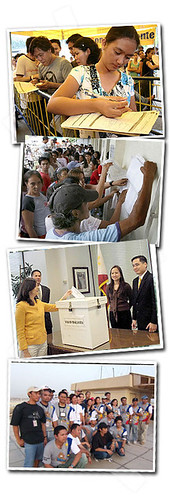Two lawmakers are seeking an inquiry into the mediocre response of overseas Filipinos to the overseas absentee voting (OAV) exercise and to find out ways of encouraging better participation. "This deterioration of overseas Filipinos' participation in the forthcoming 2010 national elections is worrisome," said Ilocos Norte Rep. Ferdinand Marcos Jr. who, with Abakada party-list Rep. Jonathan de la Cruz, filed House Resolution 1298 pushing for an inquiry.

With an estimated voting population of at least 6 million worldwide, overseas Filipinos could provide a “swing vote" if only they would all register and vote in Philippine elections. - GMANews.TV photos
HR 1298 is asking the House committees on Suffrage and Electoral Reforms, Foreign Affairs and Overseas Workers Affairs to look into the low turnout in the upcoming 2010 elections, and to also to find the reasons for the low participation of Filipinos abroad in the 2004 and 2007 national elections. Marcos and De la Cruz said the investigation seeks to aid the legislature in crafting measures to allow millions of OFWs to exercise their basic right to vote. In a telephone interview with GMANews.TV on Wednesday, De la Cruz said that they were not determined to put a lid on the overseas absentee voting. “We still believe that our overseas Filipinos should not be denied of their right to vote," said De la Cruz, who once served as labor attaché in Saudi Arabia. “But it’s disappointing," he added, “At first we thought they were interested. We have been spending a lot on this." Since the OAV was signed into law in 2003, figures have not been encouraging. In the 2004 national elections, only 360,000 of the more than four million qualified overseas Filipinos registered. Of this figure, only 65 percent or 233,092 cast their votes. In the 2007 midterm elections, at least 145,000 more overseas Filipinos registered to vote, raising the total number of OAV registrants to more than 500,000. However, only 81,732 cast their ballots. For the 2010 polls, the government targeted at least a million new absentee voters, but less than 235,000 have signed up during the February to August 2009 registration period. Nelson Padalhin, head of the Department of Foreign Affairs’ OAV Secretariat, said his department is willing to explain to lawmakers the result of this year’s registration period.
Disillusioned? Earlier, Padalhin said that the DFA has done everything, from talking to Filipino community leaders to aggressively promoting the registration in the media to increase the OAV figures, but new overseas voters seem elusive. “It is likely that most Filipinos overseas have already registered to vote since 2003," Padalhin said. Advocacy leader Susan Ople of the Blas F. Ople Advocacy Center vouched for the DFA OAVS' efforts in bolstering the number of Filipino registrants and heightening the awareness of Pinoy migrants about the 2010 elections. "They did a great job," she said.
Uninterested or discouraged? But she said many Filipinos abroad are simply uninterested in participating in the elections. "
Iniisip nila na kahit naman bumoto sila, wala namang nangyayari (They're thinking, even if they vote, nothing will change)," she said. At the height of the “Hello Garci" controversy when many of President Gloria Macapagal Arroyo’s allies asked her to resign for allegedly rigging the 2004 elections, many OFWs wondered whether their participation in Philippine elections was a useless exercise. Ople also said the dismal number of overseas Filipinos who registered might also be a sign that they are bored with the roster of candidates. "They have to titillate and excite voters," she said. [See:
'Titillate, excite overseas Pinoys to boost OAV turnout'] Ellene Sana, executive director of the Center for Migrant Advocacy, blamed the poor OAV turnout in part to several technical problems in the Middle East, particularly the lack equipment to process the number of applicants. According to her, what used to be more than 50 data-capturing machines in Saudi Arabia was reduced to less than a dozen. Sana said a fire in the Riyadh embassy several years back, has destroyed several machines, which was not fully replenished during this year's six-month registration period. An estimated 1.2 million Filipinos live and work in Saudi Arabia.
- GMANews.TV 





